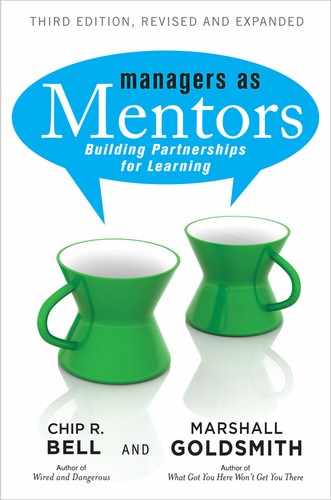4
CASE STUDY
Every Knock’s a Boost
An Interview with Mark Tercek, President and CEO of The Nature Conservancy

How would you describe your most important mentor?
My most important mentor is a guy I worked with for years. He was my boss and then became a peer. He always told me in a very direct way what he thought I should do in difficult circumstances. In my heart of hearts, I already knew his advice was the right thing to do. But I would try to rationalize not doing it because it was the awkward stuff. He was a good mentor because he would make me do it. “You have to do X, Y, and Z,” he would say, and there was no alternative. Even if it was difficult, it was always the right thing to do to move things forward. He never offered me the easy way out.
What traits were most instrumental in his work with you?
His willingness to give me advice I’d rather not hear. He was insistent and he overcame my objections. He was kind of annoying, to be honest, but he didn’t care. He put giving me good advice over being liked. And he gave his advice in an irritating, lecturing way. But it was good advice, so I kept going back for more.
When he was no longer my boss, I’d still go to him for advice. But at some point in my career, I remember thinking very clearly, I don’t really need his advice anymore. I now know to do the things he advises me to do. Now he is more of a friend than a mentor. He liked being a mentor, and the more people he mentored, the better he got at it.
What is one example or incident or illustration of how this person was helpful to you?
Years ago, I was working an investment banking transaction in Asia. It was a public offering of stock, and the deal was going very badly by the standards of that day. Today it might not have been a big deal, but it was back then. I was a mid-level person at the organization, and the people who ran the firm were very concerned.
In the middle of the night (in Asia), I talked with my mentor. He told me I needed to call the number two person at the firm and tell him what was going on. It was scary. This person was intimidating and it was his part of the firm that represented the clients who had bought the stock that was now going down. He was likely going to be angry and unsympathetic. I didn’t want to call him.
My mentor said, “You have to call him. One, he needs to hear these things directly from you. He needs to hear your side of the story. Two, you are doing all the right things to deal with this tough circumstance. This is an opportunity for you to show him that, even if he is unfriendly or critical or it feels like a bad conversation. You’ll be showing him you are not afraid, that you are going to do the right thing, and that he and the firm should have confidence in you.”
My mentor often told me, “Every knock’s a boost.” I was in a tough situation, but the fact that people would try to blame it on me was actually a boost. Why? Because all eyes were on me. It was an opportunity to show people what I could do. And I did. Sure, it was awkward and unpleasant, but I did the right things, given the circumstances, and the senior executive was probably favorably impressed.
Without my mentor’s insistence that I deal with the issue directly, the senior executive would have seen only the negative. He would have thought we weren’t doing what was right to deal with the circumstance. It wasn’t easy, but it was the right thing to do. I knew this in my gut, but my mentor gave me the push I needed. He didn’t recommend I do it, or suggest that I might consider it. Instead, he said, “Call him now. Every knock is a boost. You’ll be fine. Do it now!” It did become a high-profile challenge, and people got to watch me in action because I was the person on the scene. I dealt with it well. If I had ducked the knock, someone else would have gotten the boost.
What other advice or feedback did he give you?
He advised me to take charge in difficult situations, to step up and take responsibility even when circumstances were tough. When you’re leading a firm through tough situations in a responsible and smart way, there’s no time for placing blame or being defensive. He also helped me handle interpersonal issues. If I was dealing with a tough personality, he’d say, “Go see the person right now. Don’t leave them a voice mail. Don’t send them an e-mail. Go look them in the eye and tell them what you are doing. Don’t make it complicated; just get in front of it.”
He gave me another kind of advice when I was in a new job. He told me to meet with as many people as I could and ask them for any input, guidance, feedback, and suggestions they might have. And then shut up and listen.
Whether advising me on difficult situations or on starting a new job, there was a running theme to all of his advice: the best path is usually the most direct one. Get in front of people and address head-on whatever might need to be addressed.
I’m enormously grateful to my mentor, and when I’ve had the opportunity, I’ve tried to be a good mentor just like he was.
